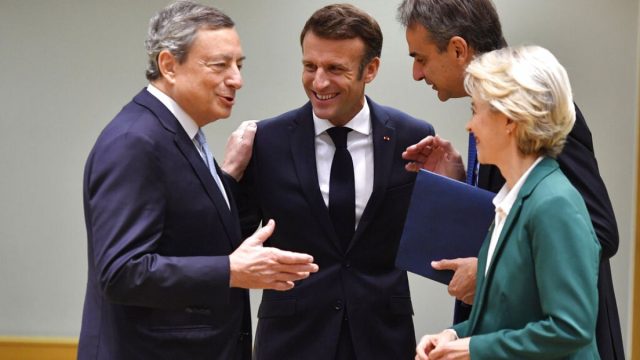The former Italian prime minister proposes a “radical change” in the face of aggressive competition from China and the United States. Draghi proposes the use of controversial Eurobonds, the proposed plan for decarbonization and competitiveness could entail defensive trade measures, he says.
Former Italian Prime Minister Mario Draghi advocates a common debt in the EU and the end of national vetoes in a historical report on economic competitiveness presented on Monday to the Community Executive.
The long-awaited report, initially scheduled for June, proposes a “new industrial strategy for Europe” and states that The era of open, rules-based trade is on its way out. Your conclusionsdrafted with the help of European Commission officials, arrive just days before its president, Ursula von der Leyen, sets out the duties of her commissioners for her next five-year term.
“The EU must move towards the regular issuance of common safe assets to enable joint investment projects between Member States and contribute to the integration of capital markets,” the report says, a step towards the controversial idea of Eurobonds, in which Member States issue collective debt.
The EU has already moved in that direction with Next Generation EU, an investment plan of several hundred billion euros emerged in the wake of COVID-19, but the idea has raised fears of subsidizing weaker member statesamong “frugal” Member States like Von der Leyen’s Germany.
In April, Draghi promised a “radical change” amid growing concern about the huge productivity gap with the United States, where incomes have grown twice as much as in the EU since 2000.
China and the United States on target
It proposes more aggressive measures in response to the huge subsidies for green technology offered in China and the United States. “A joint plan for decarbonization and competitiveness could entail, in specific circumstances, defensive trade measures to level the global playing field and compensate state sponsored competition abroad,” the report states.
“The era of open global trade governed by multilateral institutions appears to be passing,” he added, pledging to coordinate the control of foreign direct investmentamid fears that China is hoarding technical knowledge vital to European innovation and security.
Draghi has some tough messages for the European Commission, which he says needs to exercise more “self-control” when it comes to regulation. “The Commission’s legislative activity has grown excessively,” he said, stating that more than half of small and medium-sized enterprises They complained about paperwork and regulatory obstacles.
Changes in how the EU is governed
The Italian, who when he headed the European Central Bank promised to do “whatever was necessary” to save the euro, also proposed to clip the wings of the Councilthe body representing member states and which has often blocked EU reforms.
According to the report, the measures already existing in the European Treaties “should be used to generalize qualified majority voting in all political areas of the Council”, abandoning a system that allows governments to veto economic or foreign policy plans.
In recent months, Hungary has blocked a €50 billion aid package for Ukraine, and Estonia has put the brakes on value-added tax reforms.
Von der Leyen has pledged to make promoting growth a priority in their next five years at the head of the EU executive, after a first term in which he prioritized the fight against climate change, COVID-19 and the response to the war in Ukraine.







